What do Bees Dislike? Unveiling Their Top Pet Peeves
Understanding what bees dislike can be really helpful, especially if you’re trying to enjoy your time outdoors without getting too many unexpected visitors. Bees have a keen sense of smell and are particularly averse to strong scents like peppermint, cinnamon, and vinegar. These smells can be used to create a barrier between you and the buzzing bees, making them an ally rather than a nuisance.
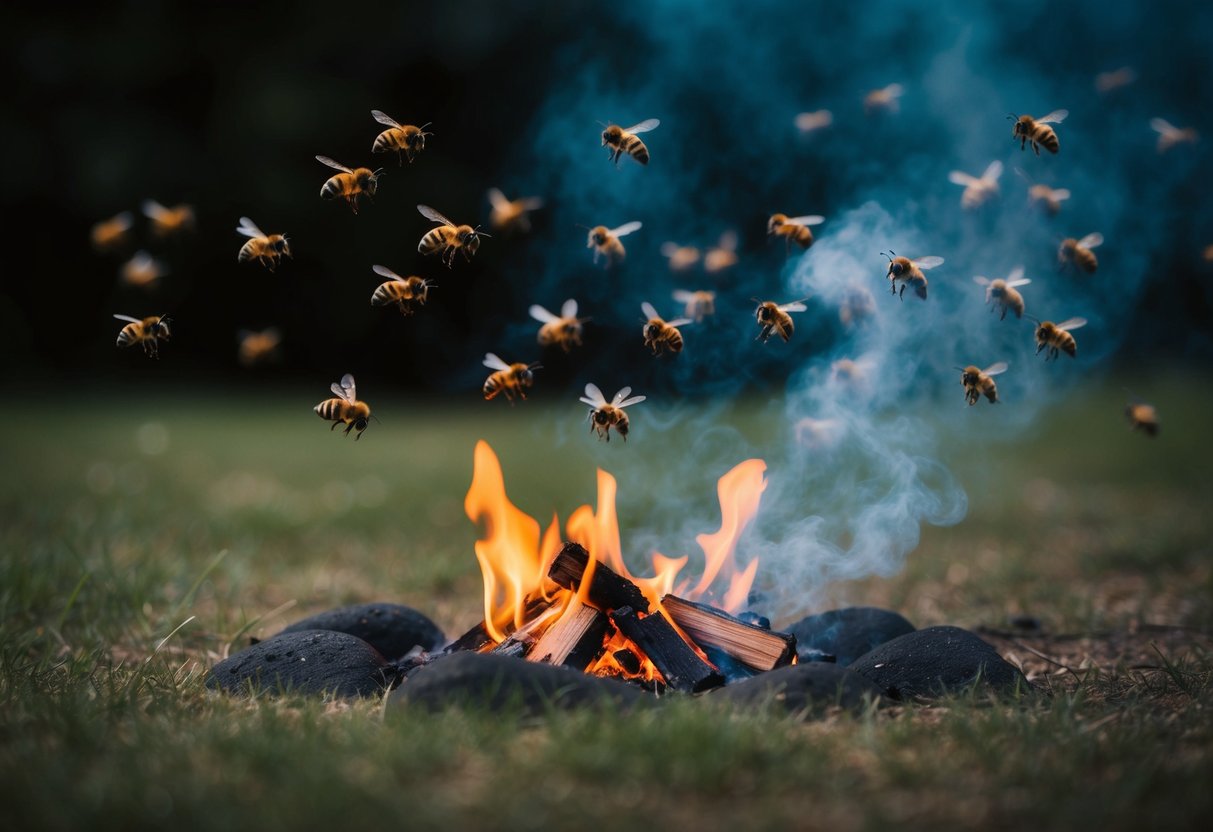
Think about how refreshing a clean, minty scent is to you, but imagine for a bee, it’s overwhelming! This is something you can use to your advantage by planting peppermint or using peppermint oil in areas you’d like bees to avoid. It’s a small change that can make a big difference in your environment.
Another tip involves using natural items you might already have, like garlic or cucumber peels. Placing garlic cloves in your garden or cucumber peels in areas where bees might nest can keep them away and maintain a calm atmosphere for your outdoor space. These methods work well if you’re looking for simple, natural ways to manage bees in your surroundings.
The Importance of Bees to Our Environment
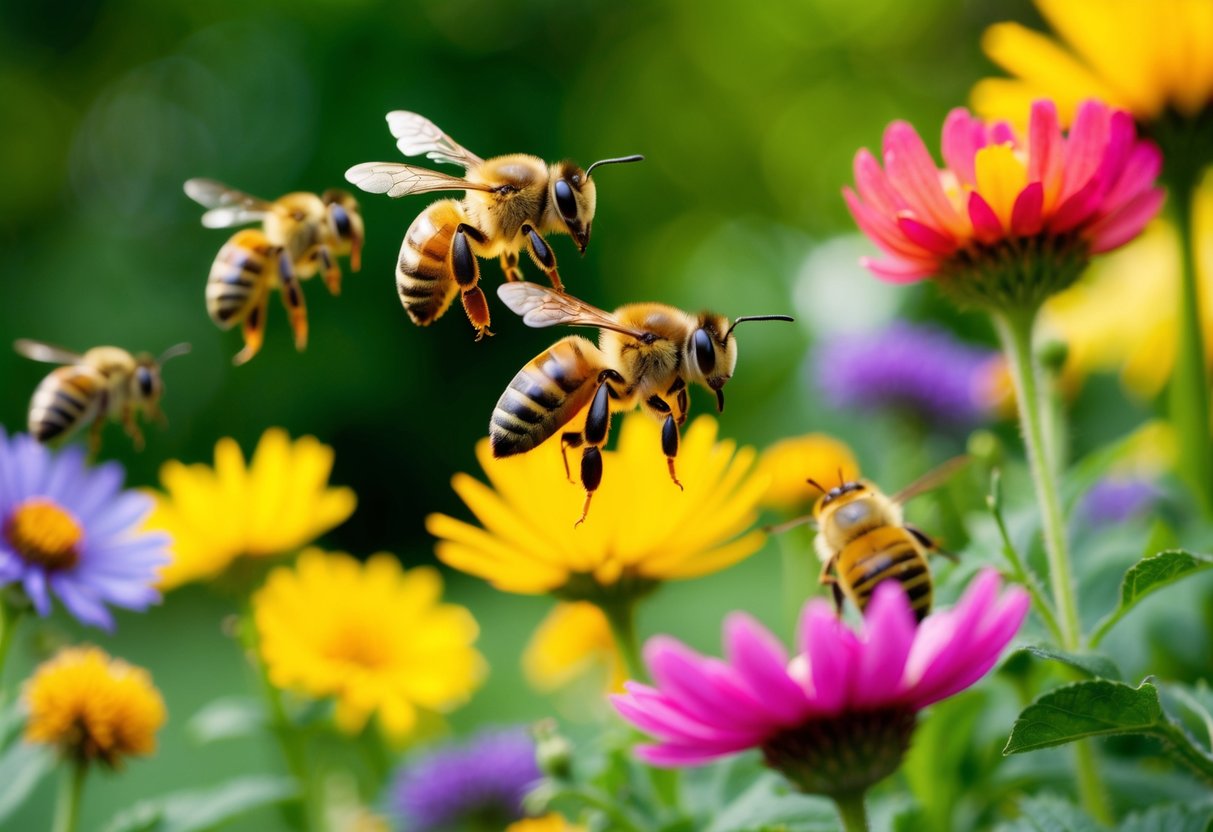
Bees are vital players in our ecosystems with their role in supporting biodiversity and food production. They don’t just make honey; they maintain the health of our environment and gardens.
Pollination and Biodiversity
Bees are key pollinators, helping plants reproduce. By moving pollen from one flower to another, they assist in the production of fruits, vegetables, and seeds. This process is crucial for the survival of many plant species.
Biodiversity thrives because of bees. As they pollinate, they support a wide range of plants which in turn provide habitats and food for other creatures. Healthy plant populations also help preserve soil quality and provide clean air by increasing oxygen levels.
In a bee-friendly environment, an abundance of flowering plants can enhance these benefits. You can support biodiversity by planting native flowers and avoiding pesticides, which harm bees and disrupt pollination.
Bees in the Garden and Food Production
In gardens, bees are friends to your plants. By visiting flowers, they improve crop yields and quality. This is particularly important if you grow fruits or vegetables, as bees contribute to higher and more reliable harvests.
Bees are essential in food production beyond your backyard. Many crops depend on bees, including almonds, apples, and berries. Farmers rely on these pollinators to meet food demands. Supporting bee populations helps ensure a steady food supply.
To make your garden bee-friendly, include a diverse range of flowers that bloom through different seasons. Providing water sources and shelter, like bee houses, can also attract and keep them healthy and active in your garden.
Understanding Bees’ Sense of Smell

Bees have an amazing sense of smell, which they use to find food and communicate with each other. Their sense of smell is essential for their survival and plays a crucial role in their interactions.
The Role of Scents and Pheromones
Bees rely heavily on scents to locate flowers and navigate their environment. They can detect floral scents from a great distance, which helps them find nectar and pollen to bring back to the hive. This keen sense of smell is much better than that of humans and is vital for their efficiency in gathering food.
Pheromones also play a key role in how bees communicate. These chemical signals are used to coordinate activities within the hive, like showing paths to food sources or warning of dangers. For instance, if a bee finds a good food source, it releases a pheromone to help guide other bees to the spot. Understanding how bees use scents and pheromones can help you manage or deter them more effectively, using smells they dislike such as those discussed in these tips.
Natural Elements that Bees Avoid
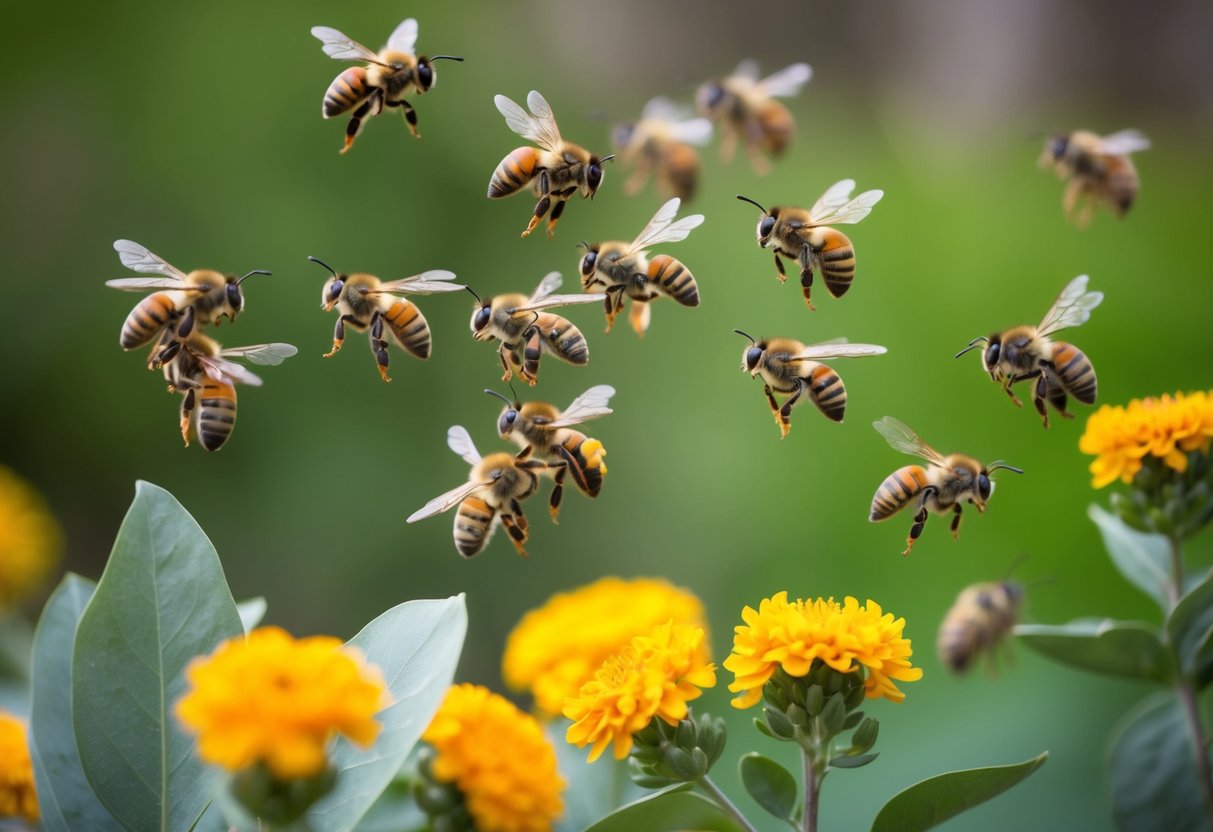
Bees tend to stay away from certain plants and household items because of their strong scents or specific properties. These natural elements can be handy if you’re looking to keep bees at bay.
Specific Plants and Scents
Several plants and scents are known to repel bees. Citronella and mint are popular choices because of their strong aromas. Planting eucalyptus, lavender, or lemongrass in your garden can also help keep bees away.
Another effective natural repellent is marigold. Its scent is unpleasant to bees and can deter them from lingering. If you prefer using oils, consider clove or cinnamon. These strong-smelling oils can be placed in areas where you want to deter bees.
Household Items That Repel Bees
Certain household items can be surprisingly effective in keeping bees away. Vinegar is one such item. Mixing it with water and spraying in areas frequented by bees can be useful. Garlic is another option; its smell is overpowering to bees. You can crush garlic cloves and place them around your garden.
Smoke is another natural repellent. When you have a barbecue or a small fire pit, the smoke can discourage bees from coming near. If you’re looking for a more convenient method, try using cinnamon powder sprinkled near entry points to deter bees.
Creating a Bee-Free Environment
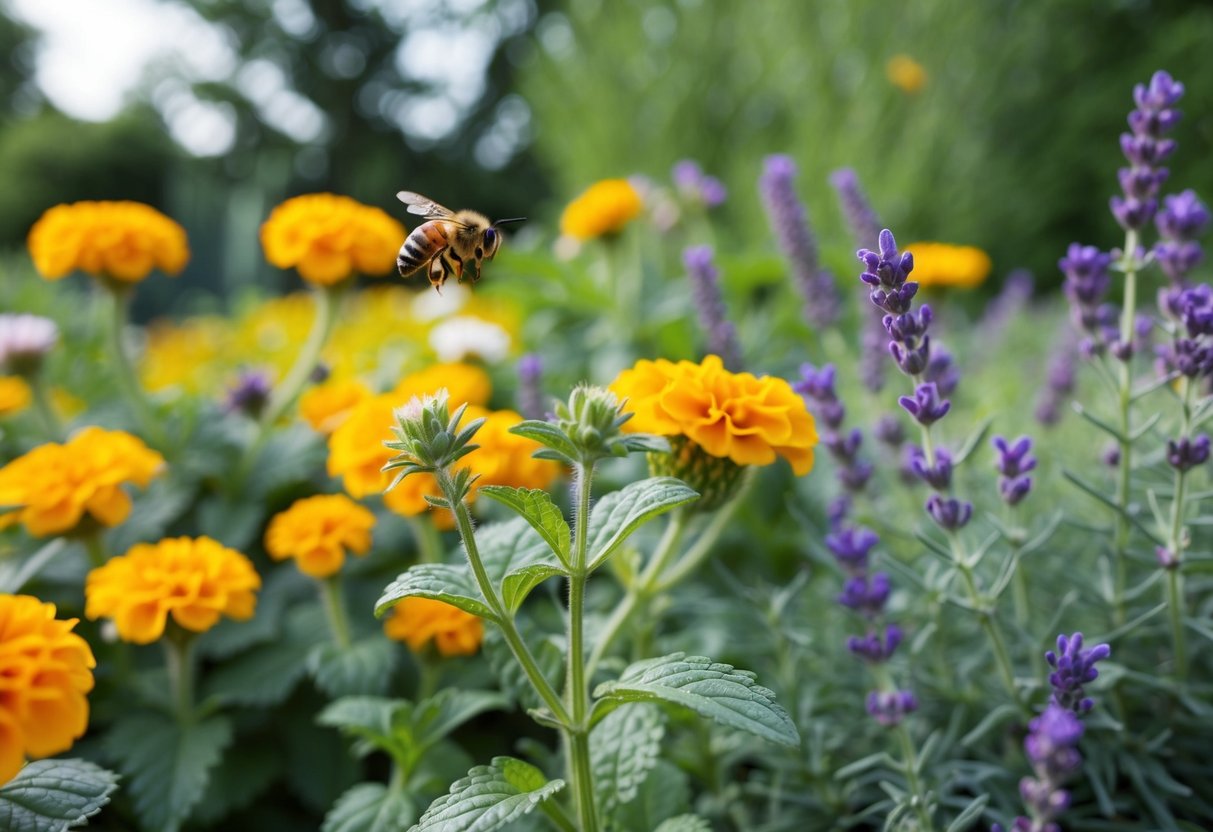
To make your space less attractive to bees, use methods like essential oils, vinegar solutions, and certain food scents. These strategies can help keep bees away without harming them.
Using Essential Oils
Essential oils are an effective method to repel bees. Peppermint, citrus, and geranium oils are known for their strong scents, which bees dislike. You can mix a few drops of any of these oils with water and spray the solution around areas where you want fewer bees.
Another option is rosemary oil, which is both aromatic for humans but unpleasant for bees. You might also find almond oil helpful for keeping bees away. Use it sparingly around outdoor seating areas for maximum effect.
Applying Vinegar Solutions
Vinegar solutions are another natural repellent. Mix equal parts of vinegar and water to create a spray. This solution can deter bees without using harsh chemicals. Apply it on surfaces like decks or patios.
Adding a few drops of garlic powder enhances the mixture, making it even more effective. The strong aroma discourages bees from hovering around.
For extra strength, you can combine vinegar with essential oils like marigold or lemongrass. This blend creates a potent shield against bee invasions.
Food Scents Bees Dislike
Certain food scents can help in your strategy to keep bees away. Garlic and onion are popular choices, as their strong smells are unpleasant to bees. Sprinkle garlic powder around areas you wish to protect.
Eucalyptus is another food-related scent that acts as a bee deterrent. You might try using cucumber peels or slices, as bees also tend to avoid these.
Avoid placing sugary fragrances or foods outside, since these attract bees. Instead, opt for scents that act as natural bee repellents. This will help maintain a bee-free environment effectively.
Recommendations for Deterring Bees Naturally
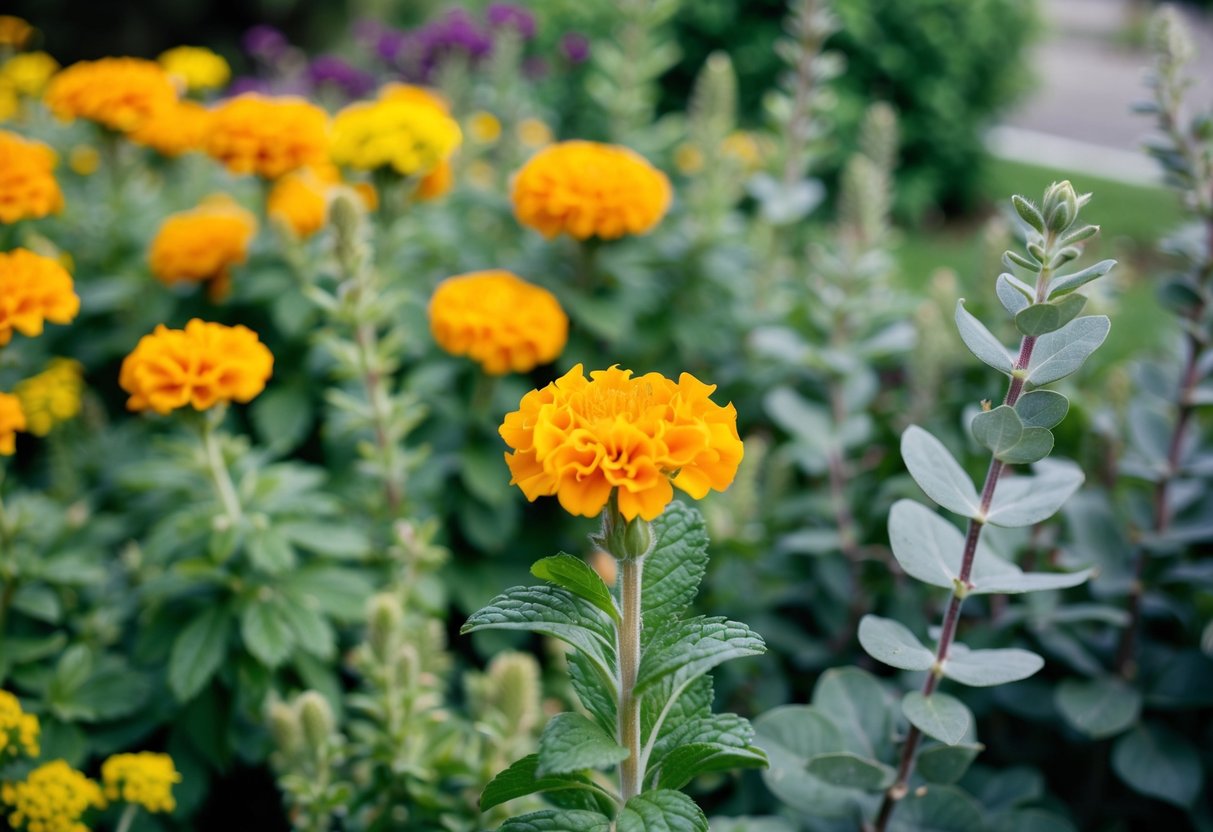
Understanding which scents and plants bees dislike can be helpful if you’re looking to keep them away without harming them. Using these natural methods, you can create a more bee-free environment in your yard or garden.
Practices to Discourage Bee Presence
One effective way to discourage bees is by using natural repellents. Bees tend to dislike the smell of strong herbs and oils. For instance, lavender, eucalyptus, and spearmint can be particularly off-putting to bees.
You might try essential oils like lemongrass or peppermint. Place these in small, shallow dishes around your outdoor spaces.
Planting certain plants like clover or mothballs can naturally ward off bees. While clover may attract some bees, its presence in a wider mix of deterrent plants can help discourage a larger influx of them.
Some odors can also keep bees at bay. Spraying simple mixtures such as water with a touch of vanilla can deter them.
Creating Natural Barriers
Creating natural barriers can further help in keeping bees away. Consider using plants that deter bees, like mint or citronella. These can be strategically placed around your outdoor seating areas for added protection.
Another tactic involves using items with strong smells, such as bananas. Although they may seem appealing to us, the scent of aging bananas can confuse bees and make them wary.
For a more structured approach, you can enhance your garden with taller plants that create a physical barrier. Berry bushes or even almond trees can serve as a shield, minimizing bee attraction and providing some privacy.







